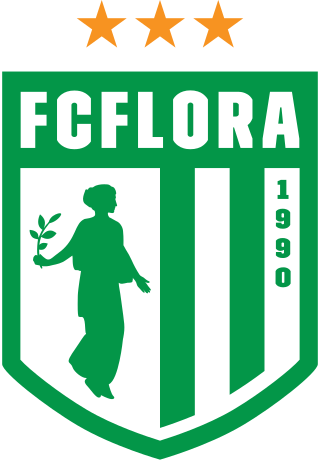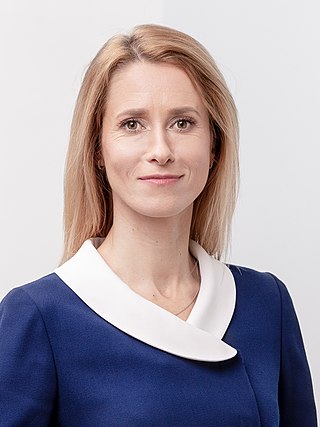| |||||
| Decades: | |||||
|---|---|---|---|---|---|
| See also: | |||||
This article lists events that occurred during 2002 in Estonia .
| |||||
| Decades: | |||||
|---|---|---|---|---|---|
| See also: | |||||
This article lists events that occurred during 2002 in Estonia .

Tallinn is the capital and most populous city of Estonia. Situated on a bay in north Estonia, on the shore of the Gulf of Finland of the Baltic Sea, Tallinn has a population of about 454,000 and administratively lies in the Harju maakond (county). Tallinn is the main financial, industrial, and cultural centre of Estonia. It is located 187 km (116 mi) northwest of the country's second largest city, Tartu, however only 80 km (50 mi) south of Helsinki, Finland, also 320 km (200 mi) west of Saint Petersburg, Russia, 300 km (190 mi) north of Riga, Latvia, and 380 km (240 mi) east of Stockholm, Sweden. From the 13th century until the first half of the 20th century, Tallinn was known in most of the world by variants of its other historical name Reval.

The Eurovision Song Contest 2002 was the 47th edition of the Eurovision Song Contest. It took place in Tallinn, Estonia, following the country's victory at the 2001 contest with the song "Everybody" by Tanel Padar, Dave Benton and 2XL. Organised by the European Broadcasting Union (EBU) and host broadcaster Eesti Televisioon (ETV), the contest was held at the Saku Suurhall on 25 May 2002. The contest was presented by Estonian opera singer Annely Peebo and actor Marko Matvere. It was the first Eurovision Song Contest held in one of the former Soviet republics.

The Estonian Reform Party is a liberal political party in Estonia. The party has been led by Kaja Kallas since 2018. It is colloquially known as the "Squirrel Party".

FC Flora, commonly known as Flora Tallinn, or simply as Flora, is a professional football club based in Tallinn, Estonia, that competes in the Meistriliiga, the top flight of Estonian football. The club's home ground is Lilleküla Stadium.

The Estonia national football team represents Estonia in international football matches and is controlled by the Estonian Football Association, the governing body for football in Estonia. Estonia's home ground is Lilleküla Stadium in the capital city Tallinn.

Konstantin Päts was an Estonian statesman and the country's president in 1938–1940. Päts was one of the most influential politicians of the independent democratic Republic of Estonia, and during the two decades prior to World War II he also served five times as the country's prime minister. After the 16–17 June 1940 Soviet invasion and occupation of Estonia, President Päts remained formally in office for over a month, until he was forced to resign, imprisoned by the new Stalinist regime, and deported to the USSR, where he died in 1956.

The Lilleküla Stadium is a football stadium in Tallinn, Estonia. It is the home ground of football clubs Flora and Levadia, and the Estonia national football team. With a capacity of 14,336, it is the largest football stadium in Estonia.
Eesti Televisioon (ETV) is an Estonian free-to-air television channel owned and operated by Estonian Public Broadcasting. It made its first broadcast on 19 July 1955.

Estonia has participated in the Eurovision Song Contest 28 times since making its debut in 1994. Its first appearance would have taken place in 1993 but a qualification round was installed for seven former Eastern Bloc countries hoping to make their debut in the contest, with Estonia failing to qualify. Estonia has won the contest once, in 2001.

Cinema of Estonia is the film industry of the Republic of Estonia. The motion pictures have won international awards and each year new Estonian films are seen at film festivals around the globe.
The Estonian Footballer of the Year is an annual award given to the best performing Estonian footballer of the respective year. The award has been presented since 1992. From 1992 to 1994, the winner was chosen by Päevaleht, from 1995 to 2000 by Eesti Päevaleht, and from 2002 to 2003 by Estonian football journalists (EJAK). The Estonian Football Association (EJL) also named their player of the year from 1994 to 2003. Since 2004, the winner is chosen by representatives of the Estonian Football Association and football journalists. Ragnar Klavan has won the award a record seven times. The current holder is Joonas Tamm.
The 2002 Meistriliiga was the 12th season of the Meistriliiga, Estonia's premier football league. Flora won their sixth title.
Estonia participated in the Eurovision Song Contest 2002 with the song "Runaway" written by Pearu Paulus, Ilmar Laisaar, Alar Kotkas and Jana Hallas. The song was performed by Sahlene. In addition to participating in the contest, the Estonian broadcaster Eesti Televisioon (ETV) also hosted the Eurovision Song Contest after winning the competition in 2001 with the song "Everybody" performed by Tanel Padar, Dave Benton and 2XL. ETV organised the national final Eurolaul 2002 in order to select the Estonian entry for the 2002 contest in Tallinn. Ten songs competed in the national final and "Runaway" performed by Sahlene was selected as the winner by an international jury panel.

Tartu Ülikooli korvpallimeeskond, also known as Tartu Ülikool Maks & Moorits for sponsorship reasons, is a professional basketball team based in Tartu, Estonia. They are a part of the University of Tartu Academic Sports Club. The team plays in the Korvpalli Meistriliiga (KML) and the Estonian-Latvian Basketball League. Their home arena is the University of Tartu Sports Hall.
The Korvpalli Meistriliiga (KML), known as the PAF Korvpalli Meistriliiga for sponsorship reasons, is the top-tier men's basketball league in Estonia. The league is organized by the Estonian Basketball Association.

Estonia, formally the Republic of Estonia, is a country by the Baltic Sea in Northern Europe. It is bordered to the north by the Gulf of Finland across from Finland, to the west by the sea across from Sweden, to the south by Latvia, and to the east by Lake Peipus and Russia. The territory of Estonia consists of the mainland, the larger islands of Saaremaa and Hiiumaa, and over 2,200 other islands and islets on the eastern coast of the Baltic Sea, covering a total area of 45,339 square kilometres (17,505 sq mi). The capital city Tallinn and Tartu are the two largest urban areas of the country. The Estonian language is the indigenous and the official language of Estonia; it is the first language of the majority of its population, as well as the world's second most spoken Finnic language.
Rannajalgpalli Meistriliiga is the top division in the Estonian beach soccer league.

Kaja Kallas is an Estonian politician who has been prime minister of Estonia since 2021, and is the first woman to serve in the role. The leader of the Reform Party since 2018, she was a member of the Riigikogu in 2019–2021, and 2011–2014. Kallas was a member of the European Parliament in 2014–2018, representing the Alliance of Liberals and Democrats for Europe. Before her election to Parliament, she was an attorney specialising in European competition law.
The history of Anarchism in Estonia dates back to the Russian Revolution, seeing a resurgence after the Singing Revolution.

Hannes Walter was an Estonian war historian.